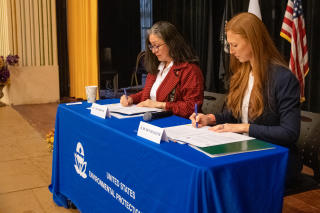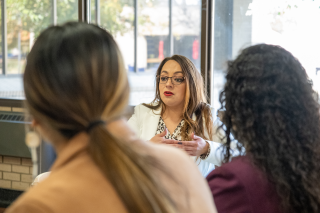Educational and Environmental Win-Wins for EPA and Indian Country
– EPA Region 7 Feature –
Haskell Indian Nations University and EPA create opportunities for Indigenous students through a successful liaison program
By Summerdawn Klain, Public Affairs
In 2023, Denmi Whiteman was a full-time student at Haskell Indian Nations University (HINU) in Lawrence, Kansas. A year later, Whiteman moved halfway across the country to start her career in EPA’s Office of International and Tribal Affairs (OITA) in Washington, D.C. As a HINU alumna, she’s not only overlooking Indian country, but representing Indigenous success.
Working in OITA, Whiteman supports the same Pathways Internship program that provided opportunities for her and her classmates at her alma mater. Through EPA Region 7 and HINU’s student career exploration liaison program, a historic partnership was created for environmental collaboration and career opportunities for Indigenous students across the country.
With her encouragement, she feels an overwhelming sense of excitement for Haskell students and hopes the liaison program will provide similar opportunities for other students in the future.
“I’m a young Indigenous woman that’s breaking barriers and given an opportunity to be in a big space with little Indigenous representation,” Whiteman said.
Historic Partnerships
Haskell Indian Nations University is a small Tribal College and University in Lawrence, Kansas, serving hundreds of students who are members of federally recognized tribes across the U.S. In 2022, EPA Region 7 Administrator Meg McCollister and HINU Interim President Julia Good Fox re-signed a Memorandum of Understanding (MOU) to continue to expand their decades-long partnership and to bring research and educational opportunities to Haskell students and EPA staff alike. Benefits like joint research projects and outreach opportunities make the student liaison program a win-win for everyone involved.
The liaison program creates new opportunities for students by focusing on climate awareness, sustainability, cultural understanding, and environmental systems, all while respecting Indigenous traditions and tribal rights.
"This reaffirmation of the partnership between Haskell and the EPA will continue to provide excellent opportunities for our undergraduates," Good Fox said. "The projects and initiatives from our partnership clearly reverberate beyond the university campus."
Program Opportunities
Anna-Marie Romero, Stanley Holder, and Luisa Breazeale – all Haskell alumni and current EPA career employees – work closely with liaison program interns and are passionate about the program.
According to Romero and Holder, they see the future for Indian country to shine brighter with the high-performing Indigenous students who apply for EPA internship opportunities.
“This is for you … for you Indigenous kids,” Holder said.
Not only does applying demonstrate great initiative, but also places Indigenous students on a supported path of excellence.
“It does not matter what type of degree you have. There’s a place for it in any department with EPA,” Romero said.
During the hiring process, Whiteman found a mentor in Romero.
“If it wasn’t for her, I would not be in the position I am today. It’s as if she could see a light in me that I didn’t, and she brought it out,” Whiteman said. “She’s the most supportive individual I’ve come to know in life.”
This gave Whiteman the enthusiasm of excelling in her pursuit of a Bachelor of Science in business administration, with encouragement from mentors.
Future of the Program
EPA and HINU continue to expand their opportunities for successful Indigenous communities, in efforts to share knowledge and experience in a field that students are passionate about – through learning and growth. This is based on performances and outcomes from the internship liaison program.
Incoming interns add to the list of Haskell students at EPA Region 7 every year. For some, the education, training, and hands-on experiences gained during the time in the program has led to lifelong careers. Additionally, the increased capacity and skill set of Indigenous students who return to their tribes will fortify tribal environmental programs.
Applying to the EPA internship program can be a process, yet Whiteman speaks on behalf of Indigenous students with encouragement to ensure their voices are heard.
“I recommend the EPA for Indigenous students because our voices are needed in these spaces. We have a perspective that you can’t teach or develop because it’s instilled within us,” Whiteman said. “Your voice can increase the visibility of environmental issues that are important to tribes – and to me, it’s bigger than Indigenous representations. I view it as giving back to our ancestors for the rights they fought for.”
During summer 2024, nine Haskell students interned with EPA, including one student who interned at EPA’s headquarters in Washington, D.C., while being accompanied by Denmi Whiteman.
Students who are interested in interning with EPA should look for Pathways program announcements (coming in fall 2024). As a reliable source for a potential Agency career, Haskell students can use this program to identify their passion and explore career opportunities
To echo the words of thousands of Haskell students and alumni, “Onward Haskell!”



